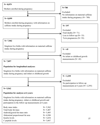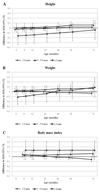Maternal caffeine intake during pregnancy, early growth, and body fat distribution at school age
- PMID: 27015969
- PMCID: PMC5427173
- DOI: 10.1002/oby.21466
Maternal caffeine intake during pregnancy, early growth, and body fat distribution at school age
Abstract
Objective: The associations of maternal caffeine intake during pregnancy with offspring growth patterns and body fat and insulin levels at school age were examined.
Methods: In a population-based birth cohort among 7,857 mothers and their children, maternal caffeine intake during pregnancy was assessed by questionnaires. Growth characteristics were measured from birth onward. At 6 years, body fat and insulin levels were measured.
Results: Compared to children whose mothers consumed <2 units of caffeine per day during pregnancy (1 unit of caffeine is equivalent to 1 cup of coffee (90 mg caffeine)), those whose mothers consumed ≥6 units of caffeine per day tended to have a lower weight at birth, higher weight gain from birth to 6 years, and higher body mass index from 6 months to 6 years. Both children whose mothers consumed 4-5.9 and ≥6 units of caffeine per day during pregnancy tended to have a higher childhood body mass index and total body fat mass. Only children whose mothers consumed ≥6 units of caffeine per day had a higher android/gynoid fat mass ratio.
Conclusions: These results suggest that high levels of maternal caffeine intake during pregnancy are associated with adverse offspring growth patterns and childhood body fat distribution.
© 2016 The Obesity Society.
Conflict of interest statement
Figures


References
MeSH terms
Substances
Grants and funding
LinkOut - more resources
Full Text Sources
Other Literature Sources
Medical

